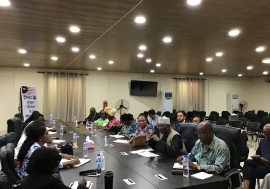Africa Watch
Global WARMING
Africa urges more action on climate change
African leaders are urging richer nations to do more to curb global warming. In a joint statement issued at a January 2007 summit meeting of the African Union (AU) in Khartoum, Sudan, they appealed for compliance with international agreements, such as the Kyoto Protocol, to reduce emissions of gases that contribute to climate change, including carbon dioxide. “We will continue to demand that countries which have not ratified the Kyoto Protocol do so,” said the statement. More than 160 countries so far have signed the protocol, under the UN Framework Convention on Climate Change, which commits them to reducing practices that lead to global warming. Notable exceptions include the US and Australia.
The 53-member AU, the continent’s premier political body, also called on industrialized countries to respect the principle of “pay as you pollute,” rather than letting developing countries shoulder disproportionate costs. Africa, experts point out, contributes the smallest amount of emissions, but will suffer the greatest consequences of climate change. “In causing global warming, [developed] countries are committing aggression against us,” said Ugandan President Yoweri Museveni.
Experts at the summit also urged greater cooperation among African countries to ameliorate the consequences of climate change.
Foreign Investment
Africa ripe for ‘first-in’ investors
Sub-Saharan Africa is fast becoming a more attractive and hospitable destination for investors, reports the Multilateral Investment Guarantee Agency (MIGA), an arm of the World Bank Group.
Despite the many challenges for business in Africa, there are “considerable possibilities for new investments, and for diversifying and expanding business activities on the continent,” says Mr. David Bridgman of MIGA.
In a new report, Snapshot Africa, the agency argues that given low current investment levels in textiles, apparel, food and beverage processing, horticulture, tourism, and call centers, “a first-in advantage awaits those investors ready to move into these relatively underdeveloped markets.” The study examines the attractiveness of the six sectors in nine sub-Saharan countries — Ghana, Kenya, Lesotho, Madagascar, Mali, Mozambique, Senegal, Tanzania and Uganda. Snapshot Africa is the fifth in a series of analyses by MIGA to guide investors with “hard to find” information on conditions in potential investment areas and help governments develop creative ways to attract foreign partners.
Appointments
 Photograph: UN Photo / Mark Garten
Photograph: UN Photo / Mark GartenMs. Asha-Rose Migiro of the United Republic of Tanzania has been appointed deputy secretary-general of the UN by the Secretary-General. She is the first African to hold this influential office. She previously served as Tanzania’s minister of foreign affairs and minister of community development, gender and children, as well as an elected member of Parliament. As foreign minister, she chaired Council of Minister’s meetings of the International Conference of the Great Lakes (see page 18) and was president of the UN Security Council in January 2006.
 Photograph: UN Photo
Photograph: UN PhotoMr. John Holmes of the UK is the UN’s new under-secretary-general for humanitarian affairs and emergency relief coordinator. As a career diplomat since 1973, he has served in various capacities, including as private secretary for overseas affairs and diplomatic adviser to Prime Minister John Major. In 1999, he was awarded a knighthood, mainly in recognition of his role in the Northern Ireland peace process. From 1999 to 2001, Mr. Holmes was ambassador to Portugal, and subsequently to France.
 Photograph: OECD
Photograph: OECDThe UN Secretary-General has appointed Mr. Kiyotaka Akasaka of Japan as under-secretary-general for communications and public information. At the time of his appointment, Mr. Akasaka had been deputy secretary-general of the Organization for Economic Cooperation and Development since August 2003. He first joined Japan’s Foreign Ministry in 1971 and was his country’s ambassador to the UN in 2000-01. He also held posts at the World Health Organization from 1993 to 1997.
 Photograph: UN Photo / Mark Garten
Photograph: UN Photo / Mark GartenMr. B. Lynn Pascoe of the US assumed the post of under-secretary-general for political affairs on 1 March 2007. In his 40-year career in the US Foreign Service, Mr. Pascoe held positions on the Soviet and China desks, was deputy assistant secretary of state for European and Eurasian affairs, was a special negotiator for regional conflicts in the former Soviet Union and served as ambassador to Malaysia and, most recently, to Indonesia.
The UN Secretary-General has appointed Mr. Muhammad Shaaban of Egypt as under-secretary-general for General Assembly affairs and conference management. Previously he served as Egypt’s assistant foreign minister for European affairs, and was ambassador to Denmark, Lithuania and Belgium. In 1997-98, he was assistant foreign minister for African affairs, in charge of managing his country’s relations with African states and regional organizations.
The UN Secretary-General has appointed Mr. Ibrahim Gambari of Nigeria as his special adviser on the International Compact with Iraq and Other Issues, at the rank of under-secretary-general. Previously he was under-secretary-general for political affairs.
Mr. Jan Egeland of Norway has been named by the Secretary-General as his special adviser on the prevention and resolution of conflict, at the under-secretary-general level. With more than 25 years of experience in humanitarian operations and peace processes, he served as under-secretary-general for humanitarian affairs and emergency relief coordinator from 2003 to 2006.















